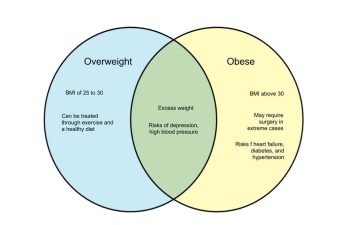
Terms like “obesity” and “overweight” sound similar and are almost used in sync with one another. But the crucial difference between both these terms arises with Body Mass Index (BMI). BMI is basically, a measure of body fat based on a person’s weight in relation to his or her height and age.
It is important to note that although BMI is correlated with the amount of fat your body has, it does not directly measure body fat. Due to this, some athletes have a BMI that puts them in the overweight category even though they do not have excess body fat.
What Are Overweight & Obesity?
In medical terminology, “obesity” and “overweight” refer to the weight that is greater than what is considered to be normal for a certain height. People become overweight due to the presence of extra body fat. However, being overweight can also be because of extra muscle, bone, or water. People who are obese, usually have too much body fat.
Your BMI can tell whether you’re at a healthy weight, overweight or obese. The greater your BMI, the greater is the risk of contracting health problems due to being overweight and obese.
Calculating BMI In Adults
BMI calculation is done using your height and weight.
BMI = W / (H2) where W is the person’s weight (in kilograms) and H is the person’s height (in meters). In other words, BMI is a person’s weight (in kilograms) divided by the square of height (in meters).
- If your BMI is below 18.5, you are underweight
- If your BMI is between 25 and 29.9, you are overweight.
- If your BMI is 30 and above, you fall in the obese category.
- If your BMI is 40 and above, you may fall in the morbidly obese category.
Causes Of Excess Weight Gain & Treatment
People often become overweight or obese due to unhealthy eating habits, consuming high caloric food and all imbalances that are usually created in between. Moreover, leading an inactive lifestyle, family history of weight issues, disability, hormonal imbalances and negative emotions like boredom, depression or anger are some common plausible causes.
In most cases where an individual is overweight, a mix of healthy diet plans, exercise and behavior modification can do the trick for losing weight. However, in cases of obese and morbidly obese patients, diet and exercise modifications do not work. It requires a deeper level of understanding of the medical condition, underlying reasons and health issues of the patient, which consequently help in treatment planning.
Why Does This Matter?
Many studies have been conducted that illustrate the increased probability of ailments like cancer, diabetes, heart diseases, sleep apnea, and high blood pressure due to obesity/overweight. The clinical definition of both these terms is taken into consideration to determine proper treatment options.
In the year 2013, the American Medical Association officially declared obesity to be a disease, thereby acknowledging its enormous impact medically, educationally and in the medical research field.
This not only raised awareness about obesity as a chronic disease but will also impact policy-making decisions in funding, treating and intervening in obesity-related medical programs. Many people having a BMI of 40 and above fall under the morbidly obese category and may be eligible for bariatric surgery.
Weight Loss Surgery Center Of Los Angeles
Usually, morbidly obese patients are required to undergo a thorough medical evaluation to ascertain the line of treatment which may or may not involve surgery. Especially when diet, exercise, and behavior changes are not giving any positive results.
If you think your weight is creating problems for you in your daily routine, it’s time that you take professional help. Whether or not you need surgical intervention, a professional medical expert will be able to determine it for you. A lot of discussion and counseling are required to take such a decision. The Weight Loss Surgery Center in LA by Dr. David Davtyan, a renowned Surgery and Bariatric Medicine specialist can assist you with this. Reach out to us for a complimentary consultation and we will help you decide which bariatric surgery option is best suited for you.
Posted on behalf of Dr. David G. Davtyan MD, FACS, FICS





